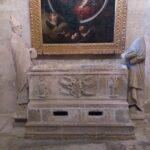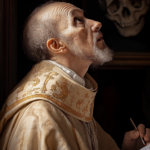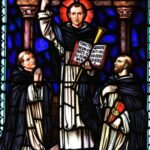St. Castorius
Saint Castorius
When he lived:
St. Castorius, a figure shrouded in historical intrigue, lived during the late Roman Empire in the 3rd century AD. His life, like a captivating enigma, has left an indelible mark on the annals of history.
Where he lived:
St. Castorius resided in the bustling city of Rome, the heart of the Roman Empire, during an era of great upheaval and transformation.
Notable world events during the time of his life:
- The Fall of the Severan Dynasty (235-285 AD) – During Castorius’s lifetime, the Roman Empire witnessed the decline and fall of the Severan Dynasty, which had ruled for nearly half a century. The political instability and power struggles that ensued paved the way for an era of uncertainty and turmoil.
- The Crisis of the Third Century (235-284 AD) – A period of unparalleled crisis for the Roman Empire, the 3rd century witnessed economic instability, military defeats, civil wars, and numerous barbarian invasions. This chaotic era posed significant challenges to the empire’s survival and resulted in substantial changes to its political landscape.
- The Persecution of Christians (250-313 AD) – St. Castorius lived in a time of fierce persecution of Christians under the Roman authorities. Emperor Decius, in 250 AD, initiated one of the most severe persecutions, demanding adherence to traditional Roman religious practices. Christians faced hardships, and many bravely stood firm in their faith, including St. Castorius.
- The Edict of Milan (313 AD) – In a momentous turn of events, the Edict of Milan was issued by Emperor Constantine and co-emperor Licinius. This edict granted religious tolerance to Christians, effectively ending the persecution. The newfound freedom allowed Christianity to flourish, profoundly impacting the course of history.
- The Great Fire of Rome (283 AD) – In 283 AD, Rome was ravaged by a devastating fire that engulfed a significant portion of the city. This calamity left thousands homeless and caused widespread destruction, forever altering the city’s landscape.
His patronage:
St. Castorius became known as the patron saint of secret keepers and confidants. His life was characterized by a deep sense of loyalty and trust, making him an emblem of discretion. People who seek guidance in preserving confidences and maintaining trustworthy relationships invoke St. Castorius to this day.
Life and Dedication
Saint Castorius is also sometimes called Castorius.
Little is known about this early Christian martyr. The only documents about him often refer to him in association with the four other young Christian men who had been persecuted with him.
There are no details about when Saint Castorius was born. The names of his parents are unknown, and the question of whether he had any siblings remains a mystery.
No one quite knows for sure when and where Saint Castorius received his early education. His actions over the years cannot be traced back to certain points in time.
Saint Castorius was said to have been a stone carver or stone mason. He was extremely skilled at his work and made the best stone pieces at the time.
He was also a devoted Christian. Saint Castorius spent his time reading the scriptures, praying, and fasting.
During that period, Christians were persecuted for their faith. While many others quickly denounced their faith, Saint Castorius stood by his own.
Saint Castorius might have lived in the imperial quarries at what is now known as Sremska Mitrovica in Sebia.
He was part of the men who are now known as the “Four Crowned Martyrs”.
Saint Castorius had been summoned to Sirmumium by Emperor Diocletian. He was commissioned to carve several sculptures.
He carried out the request to perfection, and this pleased the Emperor. The Emperor decided he wanted one more sculpture in the image of the pagan god Aesculapius.
Seeing that this was against his faith, Saint Castorius refused to carve the sculpture. It is said that the Emperor, who had taken a liking to Cassius, respected his faith.
The Emperor was, however, angered when Saint Castorius refused to bow and offer sacrifices to the gods. Saint Castorius and three other men named Claudius, Nicostratus, and Symphorian were imprisoned for this reason.
While they were imprisoned, one of the Emperor’s soldiers, Lampadius, tried to convince the men to bow down to the gods in order to save their lives. The men, however, refused the offer.
A few days later, Lampadius died. Enraged, his family went to Emperor Diocletian and claimed that Saint Castorius and the three other men had killed Lampadius.
Hearing this, Emperor Diocletian ordered that all four men be put alive in a lead coffin and then tossed into the river.
Death and Canonization
Saint Castorius died around 287 A.D. He died in Pannonia, Hungary.
Saint Castorius was buried on the Via Lavicana.
Saint Castorius was canonized pre-congregation. He is commemorated in the Roman Catholic Church on November 8.
5 Interesting Facts About Saint Castorius
- Did you know that Saint Castorius is the patron saint of fever?
and of sculptors, masons, and cattle? - Did you know that in some traditions, the “Four Crowned Martyrs” were
said to be made up of five men? - Did you know that Saint Castorius endured long hours of being
tortured for refusing to denounce his faith? - Did you know that many historians consider a man named Simplicius to
have been a part of the “Four Crowned Martyrs”? - Did you know that there’s a similar story about four different men?
Who refused to sacrifice to the pagan god Aesculapius? This might
have caused a bit of misinformation about the story of the four men.
Prayer to Saint Castorius
Holy Lord, Saint Castorius was a carver who was commissioned by the emperor to make several statues. He pleased the ruler with his artistry,but when he was asked to carve the statue of a local god, he refused because he did not want his skills to contribute to pagan worship. I ask him to pray for my talents, that I grow in my skills and have more opportunities to use them for Your glory. Convict me, O God, of the importance of reserving my gifts for holy purposes, for helping others, and for pursuing my vocation. Teach me to take no credit for my talents and to offer all praise to you. Saint Cassius, pray for me. Amen.
Source:[https://gogoodnews.net/posts/saint-castorius/]{.ul}



